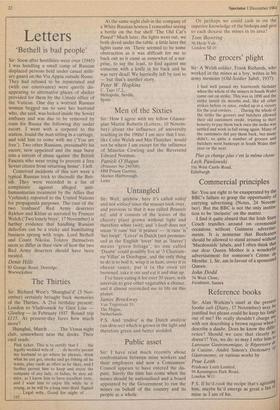Letters
`Bethel! is bad people'
Sir: Soon after hostilities were over (1945) I was handling a small camp of Russian displaced persons held under casual milit- ary guard on the Via Appia outside Rome. They had refused to be repatriated and (with our connivance) were quietly dis- appearing to alternative places of shelter provided for them by the Uniate office of the Vatican. One day a worried Russian woman begged me to save her husband who, she said, was locked inside the Soviet embassy and was due to be removed by train for Russia the following day under escort. I went with a corporal to the station, found the man sitting in a carriage, and told him to come with me (`You are free'). Two other Russians, presumably his escort, now appeared and the man burst into a torrent of abuse against 'the British Fascists who were trying to prevent a free Soviet citizen from returning home'. I left.
Contrived incidents of this sort were a typical Russian trick to discredit the Brit- ish. They were recorded in a list of complaints against alleged anti- humanitarian treatment by the Allies that Vyshinsky reported to the United Nations for propaganda purposes. The case of the two 'confused' Red Army deserters Rykhov and Khlan as narrated by Frances Welch (`Two lonely boys', 17 November) is further . evidence that handling Russian defectors can be a tricky and humiliating business sprung with traps. Lord Bethell and Count Nikolai Tolstoy themselves seem to differ in their view of how the two Red Army deserters should have been treated.
Denis Hills
83 Grange Road, Dorridge, Warwickshire






















































 Previous page
Previous page